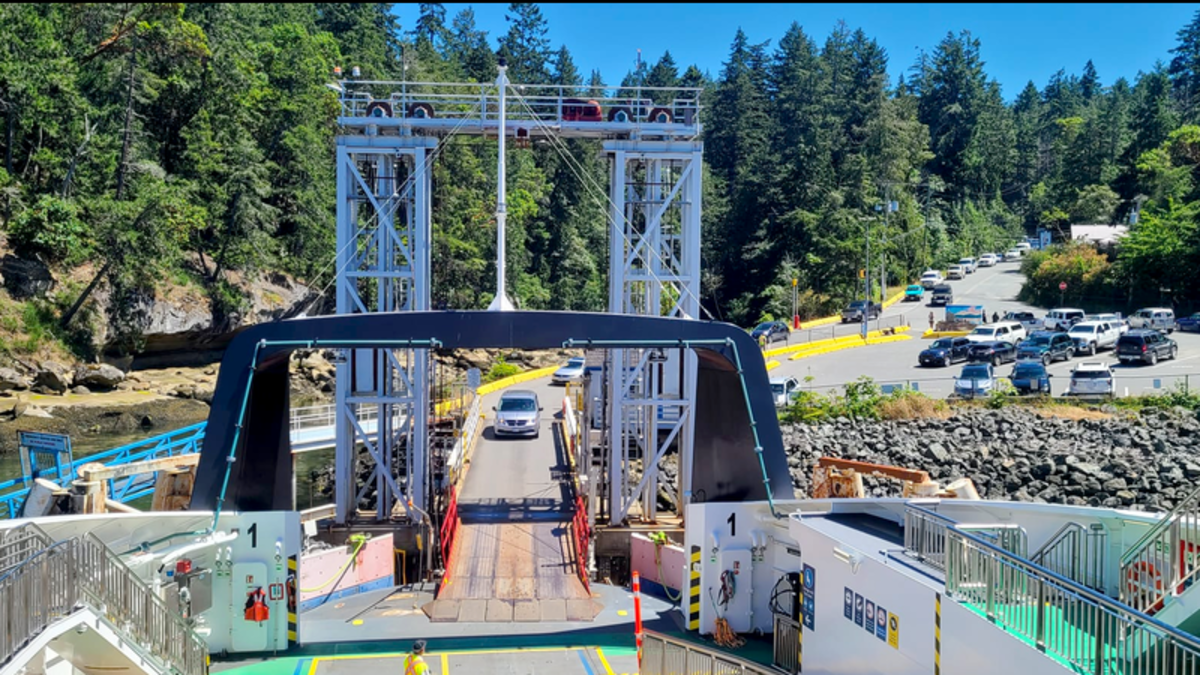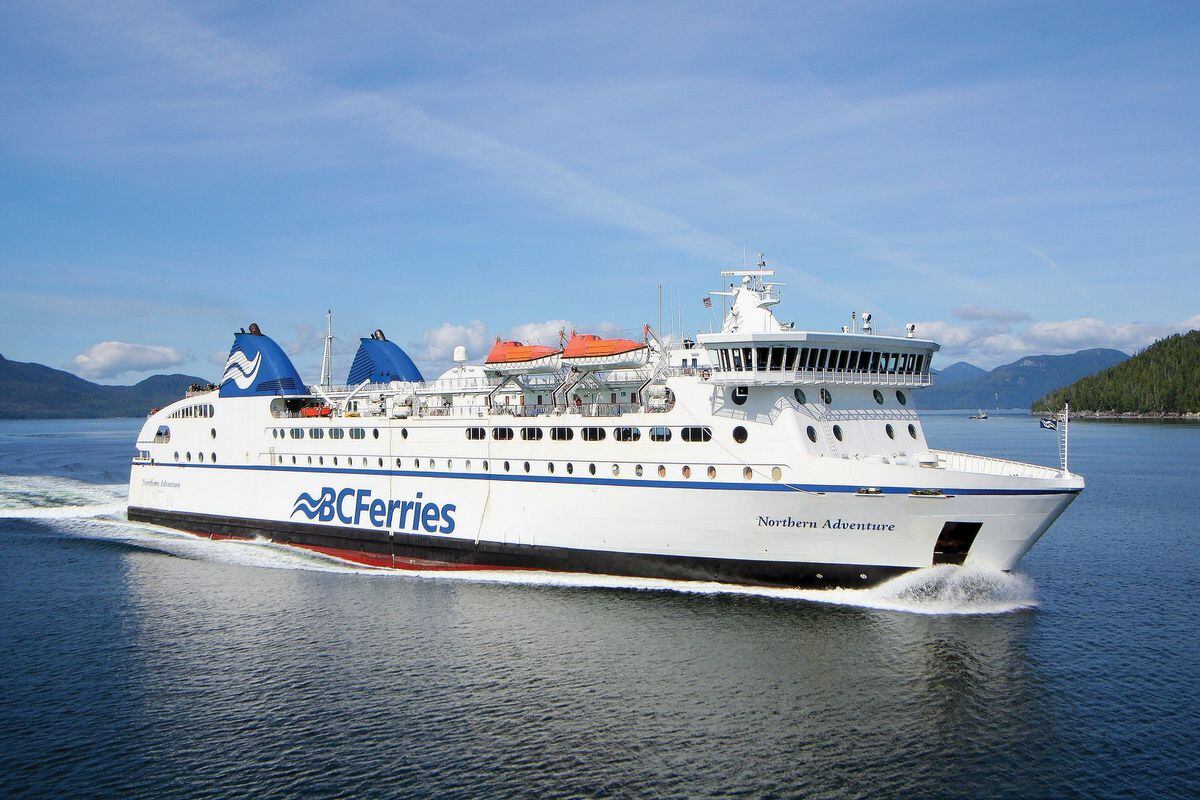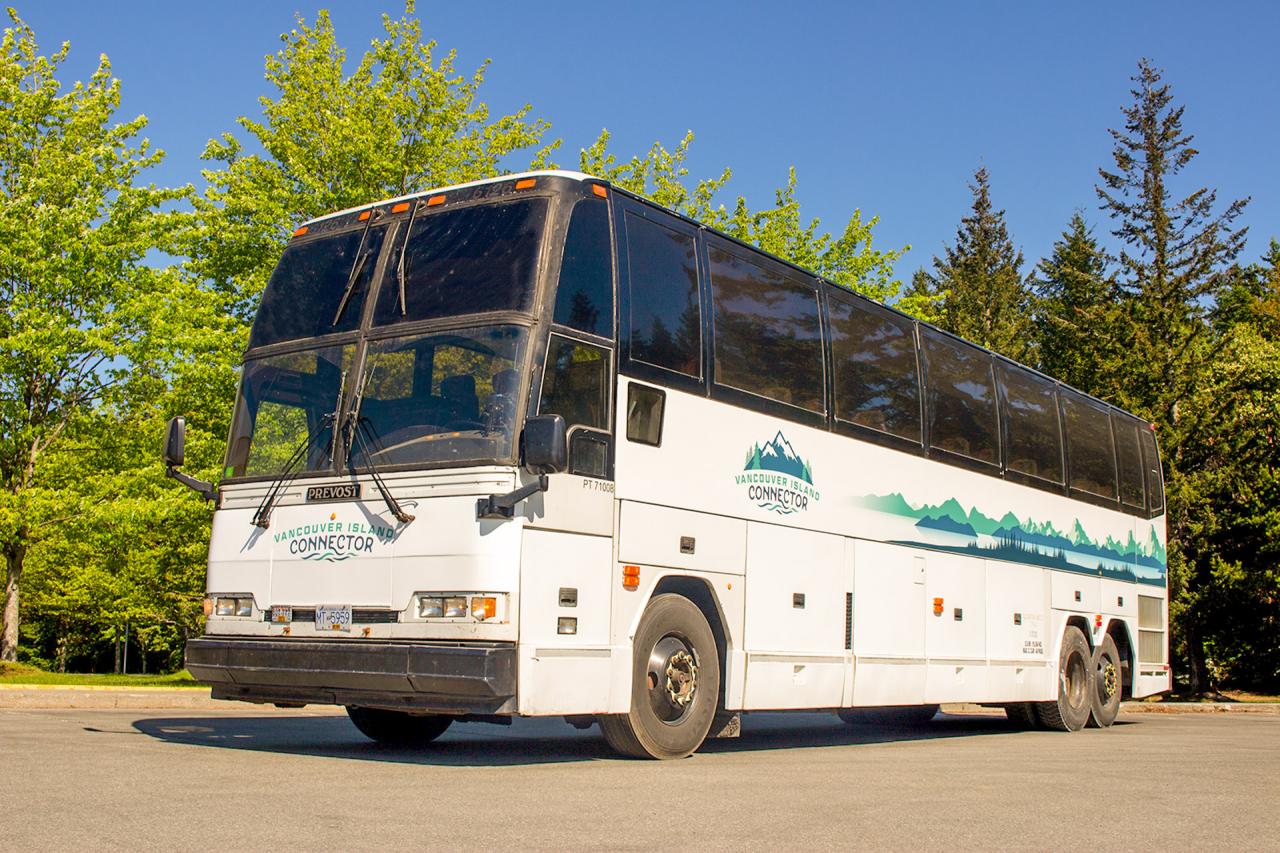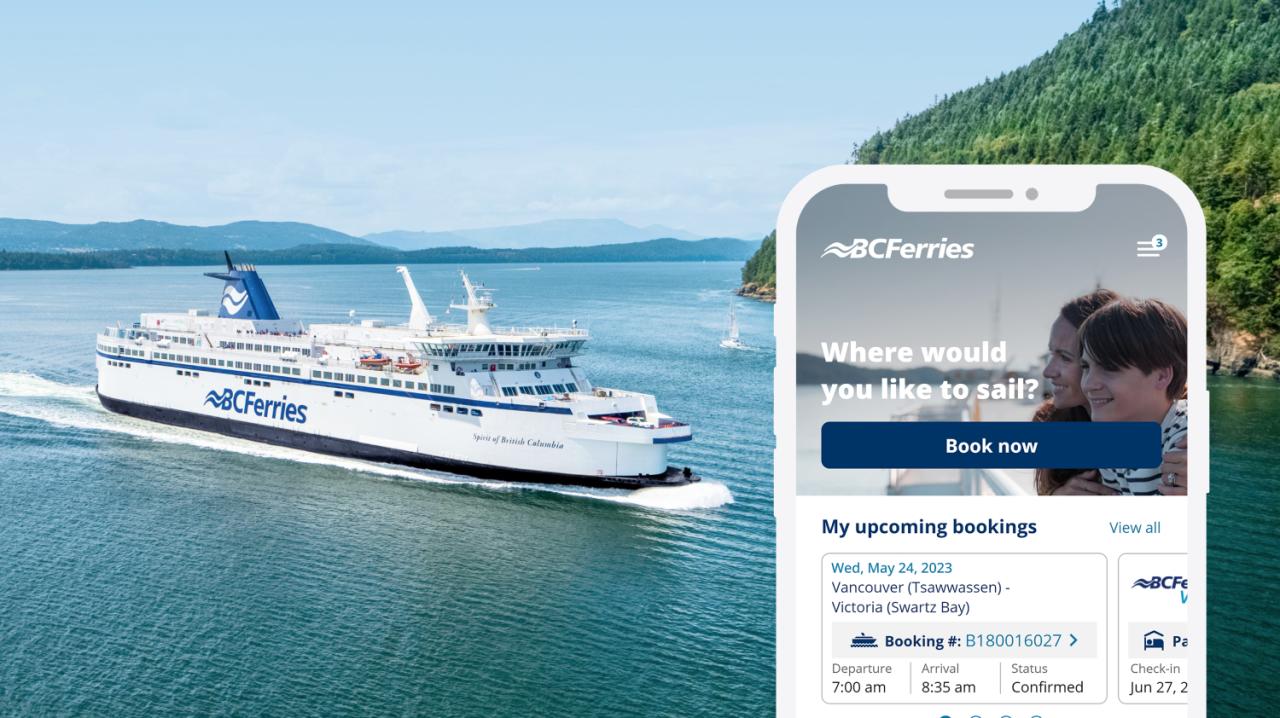BC Ferries Wifi: Need to stay connected during your ferry trip? This guide dives into everything you need to know about accessing and using the internet on BC Ferries, from coverage and speed to cost and user experiences. We’ll cover what to expect, potential problems, and even some alternatives if the ferry’s wifi isn’t cutting it.
We’ll explore the different classes of ferries and their respective wifi capabilities, detailing where you’re most likely to find a strong signal and what speeds you can realistically expect. We’ll also look at the pricing, how to connect, and common issues reported by other passengers, so you’ll be well-prepared for your next journey.
BC Ferries Wifi Availability
Getting online during your BC Ferries journey is increasingly important, whether you’re catching up on work, streaming entertainment, or simply staying connected. This section details the current wifi situation across the BC Ferries fleet. Keep in mind that availability and speed can vary depending on several factors, including weather conditions, passenger load, and vessel location.
Wifi Coverage on BC Ferries Vessels
BC Ferries offers wifi service on many, but not all, of its vessels. The availability and extent of coverage differ significantly depending on the size and age of the ferry. Generally, larger, newer ferries offer more extensive and reliable wifi coverage than smaller, older ones. Coverage typically extends to indoor areas, but outdoor access is less consistent and often weaker.
While some ferries might offer coverage on most decks, others might limit it to specific areas, such as the main passenger lounges.
Comparison of Wifi Availability Across Ferry Classes
Smaller ferries, particularly those serving shorter routes, often lack wifi entirely or have very limited, unreliable service. Larger vessels, especially those on longer routes like the Tsawwassen-Swartz Bay run, usually offer more comprehensive wifi access, though even on these ferries, speeds and reliability can fluctuate. The newer ferries in the BC Ferries fleet tend to boast better wifi infrastructure and higher speeds compared to older vessels.
This difference is due to upgrades in technology and capacity.
Wifi Availability Details
The following table provides a snapshot of wifi availability on selected BC Ferries vessels. Note that this information is subject to change, and it’s always recommended to check the BC Ferries website or app for the most up-to-date details before your trip. Typical speeds are estimates and can vary widely depending on factors mentioned previously.
| Ferry Name | Wifi Availability | Coverage Area | Typical Speed |
|---|---|---|---|
| Queen of Coquitlam | Yes | Most indoor areas, limited outdoor | Moderate (5-15 Mbps) |
| Coastal Celebration | Yes | Most indoor areas, some outdoor | Good (10-25 Mbps) |
| Mayne Queen | No | N/A | N/A |
| Spirit of British Columbia | Yes | Extensive indoor and some outdoor | Good to Excellent (15-30+ Mbps) |
BC Ferries Wifi Performance

Getting online during your BC Ferries journey is a common desire, but the experience can be a bit of a mixed bag. The speed and reliability of the wifi depend on a number of factors, meaning your connection might be blazing fast one trip and frustratingly slow the next. Let’s dive into what you can expect.The typical speed of BC Ferries wifi varies greatly.
While you might occasionally experience speeds comparable to a decent home connection, more often you’ll find yourself dealing with slower speeds, sufficient for checking email or browsing, but often too slow for streaming high-definition video or large file downloads. Many users report speeds ranging from 1-5 Mbps, though this can fluctuate wildly. One passenger described successfully video conferencing, while another reported only being able to send short text messages.
These experiences highlight the inconsistency.
Factors Affecting Wifi Performance
Several factors contribute to the variability in BC Ferries wifi performance. The number of users simultaneously connected is a major player; the more people online, the slower the speed for everyone. Weather conditions, particularly heavy rain or fog, can significantly impact signal strength. The vessel’s location also plays a role; being further from shore or in areas with poor cellular coverage will generally result in weaker wifi.
Finally, the age and technology of the vessel itself can affect the overall capacity and performance of the onboard system.
Examples of Wifi Performance in Different Scenarios
A strong wifi signal is most likely to be found on newer ferries with upgraded systems, during off-peak travel times, and on routes closer to shore with good cellular backhaul. Imagine a sunny morning on a less crowded sailing from Tsawwassen to Swartz Bay – you’re likely to experience a reasonably reliable connection. Conversely, a stormy evening on a packed sailing from Horseshoe Bay to Nanaimo, during peak season, could result in a frustratingly slow and unreliable connection, perhaps only suitable for basic text-based activities.
Another example would be a long sailing to a more remote island; the distance from cellular towers could result in a significantly weaker signal compared to shorter, more frequently travelled routes.
BC Ferries Wifi Cost and Access

Accessing the internet on BC Ferries involves understanding their pricing and connection methods. While some services might offer limited free Wi-Fi, most internet access requires a purchase. This section clarifies the costs and steps involved in getting online during your ferry journey.BC Ferries offers paid Wi-Fi access on most of their vessels. There isn’t a free option available for general use.
The pricing structure is straightforward, and the service is usually available throughout the sailing. The cost depends on the length of your sailing and the data package you choose. Specific pricing details can be found on the BC Ferries website or via their mobile app. Expect to pay a fee for a data allowance, usually offered in various data sizes for varying prices.
For example, you might find options like a small data package suitable for checking emails, and a larger package suitable for streaming.
BC Ferries Wifi Pricing
BC Ferries Wi-Fi pricing varies depending on the chosen data package. While exact pricing changes, expect to see several options. Smaller data packages will be cheaper, offering enough data for basic tasks like checking email or browsing social media. Larger data packages will cost more but will provide enough data for more demanding tasks like streaming video or downloading large files.
You should always check the BC Ferries website or app for the most up-to-date pricing.
Connecting to BC Ferries Wifi
Connecting to the BC Ferries Wi-Fi network is generally a simple process. The steps below Artikel the typical connection procedure.
1. Locate the Network
Once onboard, find the BC Ferries Wi-Fi network name (SSID) on your device’s available networks list. The exact name might vary slightly but usually includes “BC Ferries Wi-Fi” or a similar identifier.
2. Select the Network
Tap or click on the BC Ferries Wi-Fi network to select it.
3. Open a Web Browser
Once connected, open a web browser on your device (Chrome, Safari, Firefox, etc.).
4. Access the Payment Portal
You will automatically be redirected to a payment portal. This portal will provide information on the available data packages and allow you to purchase one.
5. Choose Your Data Package and Pay
Select the data package that suits your needs and follow the instructions to complete the purchase. You’ll be prompted to enter your payment details.
6. Enjoy Internet Access
After successful payment, you’ll have access to the internet for the duration of your purchased data package.
BC Ferries Wifi Payment Methods
A range of payment methods are usually accepted for purchasing BC Ferries Wi-Fi access. This offers convenience for most passengers.
- Credit Cards (Visa, Mastercard, American Express)
- Debit Cards
- Mobile Payment Services (Apple Pay, Google Pay)
BC Ferries Wifi User Experiences

BC Ferries wifi has become a significant aspect of the passenger experience, influencing travel satisfaction and impacting how people spend their time during the journey. User feedback provides valuable insights into both the positive and negative sides of this service, allowing for a comprehensive understanding of its effectiveness. This section explores user reviews to highlight both the praised aspects and common criticisms associated with BC Ferries’ wifi provision.
Positive User Experiences with BC Ferries Wifi
Many positive user experiences revolve around the convenience and productivity offered by access to the internet during the ferry ride. Passengers consistently appreciate the ability to stay connected for work, allowing them to catch up on emails, participate in online meetings, or continue working on projects without interruption. For leisure travelers, the wifi enables access to entertainment options like streaming movies or TV shows, listening to music, or browsing social media, thus enhancing the overall journey.
The availability of wifi also helps passengers remain in contact with family and friends, reducing feelings of isolation during the crossing. Furthermore, some users highlight the improved efficiency of travel planning and booking by using the wifi to access relevant information or update their itineraries. The ability to work or relax productively while traveling is often cited as a key benefit.
Negative User Experiences with BC Ferries Wifi
Despite the positive aspects, BC Ferries wifi experiences are often marred by several recurring issues. Slow speeds and intermittent connectivity are frequently mentioned complaints. Users often report difficulty streaming high-definition video or experiencing significant lag during video calls. Limited bandwidth, especially during peak times, contributes to this problem. Another common complaint is the inconsistency of the service across different ferries and routes.
BC Ferries wifi can be spotty, so checking your email before boarding is a good idea. For the latest updates on service disruptions, though, check out the news section of their website, which often includes announcements about ferry service. Knowing about potential outages beforehand will help you plan your trip better and avoid any unexpected delays with your BC Ferries wifi connection.
Some ferries offer a more reliable connection than others, leading to unpredictable experiences for passengers. Furthermore, the cost of the service, while often considered reasonable by some, is occasionally criticized as being too expensive relative to the quality of the connection. The absence of a free, basic service option is another point of contention.
Comparison with Other Public Wifi Access
Comparing BC Ferries wifi to other public wifi services reveals both similarities and differences. Similar to airport wifi or other public transportation wifi, BC Ferries wifi often suffers from congestion and inconsistent performance, particularly during peak hours. However, the maritime environment presents unique challenges not encountered in other settings, such as signal interference from the surrounding water and the potential for disruptions caused by weather conditions.
Unlike some free public wifi services, BC Ferries wifi requires a paid subscription, which some consider a significant drawback. The overall experience, therefore, often falls somewhere between the convenience of a reliable home network and the frustrating inconsistencies of completely free, publicly available wifi. The cost and performance of BC Ferries wifi should be weighed against the value of maintaining connectivity during a sea journey.
Future of BC Ferries Wifi
BC Ferries’ wifi service has come a long way, but there’s always room for improvement. The future of connectivity on board their vessels hinges on embracing new technologies and prioritizing user experience. This means faster speeds, wider coverage, and more reliable service – all contributing to a smoother and more enjoyable journey for passengers.Technological advancements will play a crucial role in shaping the future of BC Ferries’ wifi.
BC Ferries wifi can be spotty, right? Thinking about that got me wondering about large-scale communication systems, like the one needed for a project like the NORAD Santa Tracker Phone Number A Feasibility Study , which explores the logistical challenges of handling millions of calls. It makes you appreciate how complex even seemingly simple things like reliable ferry wifi can be!
This section will explore potential upgrades and improvements, considering both the immediate and long-term outlook for enhanced connectivity at sea.
BC Ferries wifi can be spotty, right? But imagine the data challenges for atmospheric research! Scientists using drones like those from Sky Elements Drones Atmospheric Research need reliable, high-bandwidth connections to transmit their findings in real-time. So next time you’re struggling with your email on the ferry, think about the much more demanding data needs of atmospheric science.
Potential System Improvements, Bc ferries wifi
Improving the BC Ferries wifi system requires a multi-pronged approach. This includes upgrading hardware, optimizing network infrastructure, and implementing advanced technologies to enhance performance and reliability. For example, the implementation of a more robust network architecture using technologies like software-defined networking (SDN) could allow for better traffic management and improved bandwidth allocation. This would lead to a more efficient and responsive wifi experience, even during peak usage times.
Furthermore, investing in higher-capacity antennas and strategically placing them across the vessels would ensure wider and more consistent coverage, minimizing dead zones and improving signal strength throughout the ferries. Finally, implementing advanced Quality of Service (QoS) mechanisms would prioritize critical applications, such as navigation and communication systems, while still ensuring adequate bandwidth for passenger use.
Technological Advancements for Improved Wifi
Several technological advancements could significantly enhance the speed and reliability of BC Ferries’ wifi. The adoption of 5G technology, for example, offers substantially higher speeds and lower latency compared to current 4G LTE systems. While deploying a full 5G network on ferries might be a significant undertaking, integrating 5G-ready equipment to prepare for future upgrades would be a prudent investment.
Another promising technology is satellite internet. Satellite internet could provide reliable connectivity even in areas with limited or no cellular coverage, ensuring a consistent experience regardless of location. The integration of advanced network management tools using artificial intelligence (AI) could also automate network optimization, allowing for proactive identification and resolution of performance issues, ultimately leading to a more stable and reliable connection.
So, you’re stuck on a BC Ferries sailing and wondering about the wifi? It’s usually pretty spotty, right? But hey, if you’re looking for something amazing to plan for after your trip, check out this awesome guide: Florida Drone Show A Comprehensive Guide. It’ll help you plan an incredible light show experience. Then, once you’re back on land with better wifi, you can properly research your next ferry trip!
This would also reduce the need for manual intervention, minimizing downtime and improving overall efficiency. Finally, the implementation of mesh networking technology would create a more resilient and self-healing network, allowing for redundancy and increased fault tolerance. If one part of the network fails, the rest would continue to function, minimizing disruptions to service.
Hypothetical Future Scenario for BC Ferries Wifi
Imagine a future where stepping onto a BC Ferries vessel means seamlessly connecting to a high-speed, reliable wifi network. Coverage extends throughout the entire vessel, from the car deck to the upper observation lounge, offering consistent speeds comparable to terrestrial broadband connections. Passengers can effortlessly stream high-definition videos, participate in video conferences, and access data-intensive applications without buffering or lag.
The network is robust and resilient, adapting dynamically to changing conditions and user demands. Real-time network monitoring and AI-driven optimization ensure minimal downtime and consistent high performance. This improved connectivity not only enhances the passenger experience but also facilitates improved communication and operational efficiency for the ferry crew, enhancing safety and overall operations. This could be achieved by a phased rollout of improvements, beginning with upgrades to existing hardware and software, followed by the integration of new technologies like 5G and satellite internet, culminating in a fully modernized and highly efficient wifi network across the entire BC Ferries fleet.
BC Ferries Wifi Alternatives
Staying connected on a BC Ferry doesn’t solely rely on their onboard Wi-Fi. Several alternatives offer internet access, each with its own strengths and weaknesses. Choosing the right option depends on your needs for speed, reliability, and cost. Let’s explore some viable options.
Several alternative methods exist for accessing the internet while traveling on a BC Ferry. These range from utilizing your mobile phone’s data plan to leveraging satellite internet connections. The best choice depends on your individual needs and budget. We’ll compare these options based on cost, speed, and reliability.
Mobile Data Plans
Mobile data plans, offered by various providers like Telus, Rogers, and Bell, provide internet access through your smartphone or other mobile devices. Coverage can vary depending on your location and provider, and costs depend on your data allowance and plan type. Performance is affected by network congestion and signal strength, which can be impacted by the distance from cell towers, particularly in more remote areas.
| Method | Cost | Speed | Reliability |
|---|---|---|---|
| Mobile Data (e.g., Telus, Rogers, Bell) | Varies greatly depending on data plan; can range from $20 to $100+ per month. Pay-per-use options are also available. | Variable; can range from slow 3G speeds to fast 5G speeds depending on location and network congestion. Expect lower speeds in remote areas. | Variable; generally reliable in areas with good cellular coverage, but can be unreliable in areas with weak or no signal. |
| Satellite Internet (e.g., Starlink Maritime) | High initial investment in equipment, plus ongoing monthly subscription fees. Costs can be significantly higher than mobile data or BC Ferries Wi-Fi. | Speeds can vary depending on weather conditions and satellite congestion, but generally offer a more consistent connection than mobile data in remote areas. | Generally more reliable than mobile data in remote areas, but still subject to weather conditions and potential service interruptions. |
Outcome Summary

Staying connected while traveling on BC Ferries is increasingly important, and understanding the nuances of their wifi service can significantly improve your journey. Whether you rely on free wifi or explore alternative options, being informed ensures a smoother, more productive, or simply more enjoyable trip. So, plan ahead, check your connection options, and enjoy the ride!
Question & Answer Hub
How much data can I use with BC Ferries Wifi?
Data limits vary depending on the purchased plan. Check the pricing details for specific allowances.
Can I use my own mobile hotspot on the ferry?
Yes, but be aware of potential roaming charges and that signal strength may vary depending on location and vessel.
What happens if I experience technical issues with the wifi?
Contact BC Ferries customer service for assistance. They may have troubleshooting steps or be able to address the problem.
Is there a time limit on using BC Ferries Wifi?
Most plans don’t have a strict time limit, but prolonged usage might be subject to fair use policies.